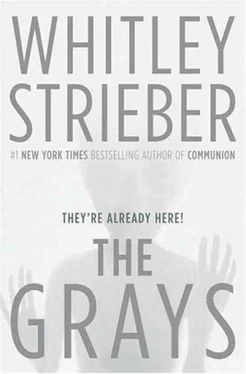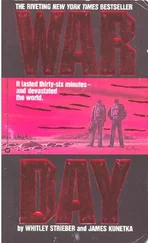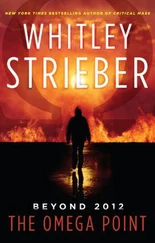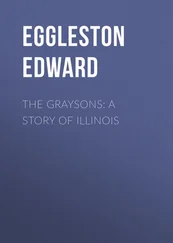The helicopter roared off into the storm and was gone. The guy knelt before Conner on one knee, and quickly wrapped a space blanket around him. “I’m going to take you home, boy.”
Conner threw his arms around the man, who held out his big gloved hands. “Come on, buddy.” Conner was not a small kid, but the guy was really tall, and picked him up easily. “We need to warm up those feet real quick.”
It felt so good to be carried that Conner just leaned his head against the guy’s shoulder, and let himself be cozy in the space blanket. As the guy strode along, he watched the woods slip away behind them.
“Conner, lots of new things are going to happen to you, I suppose you’ve realized that.”
“I’m sort of getting that feeling.”
“You’re going to have a teacher. You met her earlier tonight. Lauren Glass. I want you to know that you can count on her absolutely.”
“Who are you?”
“Somebody else who’s concerned with your well-being.”
He could feel that it was true, that there was goodness radiating from this man like heat. “Man, I’m glad you found me.” He closed his eyes.
“Sleep, child,” the man said, and held his head against his shoulder.
Then somebody was shaking him. He stirred, pulled at the blanket—and shot straight up in bed. “Dad!”
“You’re having a nightmare, son.”
“I was… outside. I was outside and—” It felt so good to see Dad there that he just threw his arms around him. “Listen, it was no dream. No dream! I was out in the woods, with—”
Conner no!
“What?”
“Conner? Out in the woods? Go on.”
“I mean, uh, in the dream. Obviously. Look, let’s go back to sleep.”
Conner lay back in the bed. Dad lingered. Good, let him stay.
Why not tell him? Conner asked.
In time, Conner, in all good time .
The voice was different, Conner noticed, bigger, somehow, echoing.
Who are you?
The collective .
Okay. What is the collective?
Conner, we are nearly seven billion, and we need your help .
“You’re kidding!”
Shh!
“What? Kidding about what?”
“Let’s go to sleep, Dad, okay?”
“Sure, Conner… of course.”
He could hear singing, then, the same tune that he had heard in the woods. He sensed, but in an indistinct, unformed way, an immense shadowy sea, that seemed to be made up of numbers and words and this deep, fleeting song. It was knowledge, he decided, so high and fine that it was a music, totally simple, utterly pure.
“Something’s happening to me, Dad.”
Dad had tears in his eyes. “Conner, you look like stars.”
“I do?”
DAN COULD NOT UNDERSTAND. HE saw his son, but his son now appeared to be a child made of the stuff of the night sky, a child whose body was somehow shining out of the planetarium of his own boyhood, and he heard a song from his boyhood, a beautiful voice humming “Suo Gan,” the song by which his own mother had seen him off to sleep when he was scared, just come back from a journey into the dark.
He sat on the bedside, and met the music with the words in the old Welsh tongue of his mother’s people: Huna blentyn yn fy mynwes, Clyd a chynnes ydyw hon… sleep, my child, at my breast, ’tis love’s arms around you .
Slowly, as Conner fell into sleep, the stars in his body faded as if with the coming of morning, and Dan was left with his boy gently breathing, lost in the deep sleep that blesses and heals childhood.
Katelyn came, and he stood up. “A miracle,” he said. “Katelyn, a miracle.” He embraced her.
“What do you mean?”
He could not explain it, not as it had been. “I just think you gave me such a grand kid.”
She leaned her head against his shoulder. Arm in arm, they returned to their own bed.
Outside, the storm howled wild, and the footprints of the man in the mask, who had carried Conner home all unseen, and entered the house by stealth and returned him to his bed, slowly filled with snow.
AS THE WEE HOURS WORE on, Mike drove the car yet again out of the snow, and went to check the Keltons. He was very annoyed with this family, who were so damnably late to bed. But this time, there was only a single dim light showing out of the upstairs bathroom window.
He trotted out into the broadness of the road. In the distance, he saw a flash and thought perhaps he heard a shout carried away by the wind. A long minute’s careful watching and listening brought only the hissing of snow and the moaning of the wind.
He glanced up at the sky. According to the radio, the storm would not abate until morning. That was important to him, because his tracks had to be covered.
He proceeded up the rougher edge of the property, where there would be flower beds in a few months. Any remaining suggestion of tracks would be harder to spot here. He moved to the back of the house, then examined the doors and windows. He found an unlocked window. Carefully, he examined it for any sign of an alarm system. Finding none, he slid it open and pulled himself into the house.
He closed the window behind him. Standing absolutely still, he got used to the sounds of the place. He prepared some ether. His first challenge would be the dog. It was awake now, but would soon fall asleep again, as long as his odor didn’t reach its nostrils. The reek of the ether would cover it, however.
He closed his eyes and listened. He had to locate that animal or he had to back out of here. He moved farther in, through the dining room, to the foot of the stairs in the front hall. It was sleeping on the landing. The instinct of the watchdog is to block the path.
He took a step, another. Could he get around it? He took another step. Now he was on the step just below the landing, looking down at the animal.
The step across it was too long. So he had to use the ether. He came down on his haunches and laid the soaked cloth ever so gently over the animal’s muzzle.
He waited. The dog’s breathing deepened. Now it began to rattle in its chest. He could kill the dog. He’d enjoy that, he detested dogs and their reeking shit and their brainless fawning over people who weren’t worth a damned glance. Like this family of fatsos. But the dog was too useful. First, the grays couldn’t control the minds of dogs. Second, he could—and to great effect.
More confident now, he went to the top of the stairs. The parents would be the lightest sleepers, so he implanted and hypnotized them first. This hypnosis was a simple process, taking only a few moments. The secret of it was that the words were chanted in a rhythm that caused them to be perceived by the subject as his own thought. These people would wake up in the morning thinking violently about Conner. When they came into range of his transmitter in town, the irritation to their temporal lobes would cause the anger to become an uncontrollable obsession.
He went next into the boys’ room and did them with equal efficiency.
Just like that, and very neatly after the agonizingly slow start, his mission on Oak Road was accomplished.
THE THREE THIEVES ALL HEARD it at the same time: breath sliding through nostrils, getting louder. Then they saw Wilkes leave the Keltons’ house. Very well , the collective said, let him go . There was a flicker of suspicion, however, when no soul drifted out of the structure. If Wilkes believed that the Kel-ton child was his target, why had he not killed him?
Of course, he would want to attempt to deceive the grays. He would not want them to know he had done the murder. He would have created some sabotage within the structure that would make the death seem an accident.
Читать дальше












